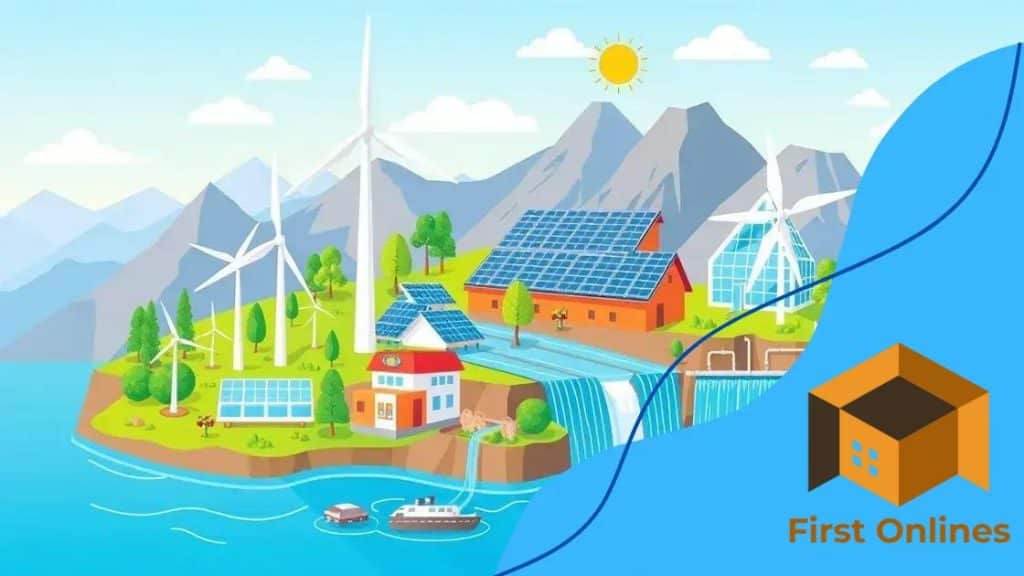Advances in renewable energy technologies and their impact on the economy

Anúncios
Advances in renewable energy technologies enhance job creation, lower energy costs, and promote economic stability while addressing challenges like intermittency and regulatory barriers, driving a transition towards a sustainable future.
Advances in renewable energy technologies are reshaping our economy, presenting opportunities for growth and sustainability. But have you ever wondered how these innovations impact your wallet or job market?
Anúncios
Overview of renewable energy technologies
Understanding renewable energy technologies is crucial in today’s rapidly changing world. These technologies harness natural resources, reducing our reliance on fossil fuels. As such, they play a significant role in combating climate change and promoting sustainability.
Types of Renewable Energy Technologies
There are various types of renewable energy technologies that we can explore. Each type has unique benefits and applications. Here are some of the most common:
- Solar Energy: This involves harnessing sunlight through solar panels to generate electricity. It is one of the most widely used renewable energy sources.
- Wind Energy: Wind turbines convert wind into electricity. This technology is increasingly popular in many countries.
- Hydropower: Utilizing flowing water to produce energy, hydropower offers a reliable energy source with low emissions.
- Geothermal Energy: This method harnesses heat from the Earth’s core, providing a consistent power source.
Each of these technologies contributes to a cleaner environment. By investing in these renewable energy solutions, we pave the way for a more sustainable future. Additionally, many countries are increasing their focus on research and development, aiming for greater efficiency in energy production and usage.
Anúncios
Benefits of Renewable Energy Technologies
The shift towards renewable energy technologies comes with numerous advantages. For one, it helps in reducing greenhouse gas emissions. This is crucial for tackling climate change and improving air quality. Furthermore, renewable energy sources are often more sustainable in the long run, as they are naturally replenished.
- Job Creation: The growth of the renewable energy sector has led to the creation of countless jobs.
- Energy Independence: Countries can reduce their dependence on imported fuels.
- Stability in Energy Prices: Renewable energy can stabilize prices in the energy market.
Investing in renewable energy is not just a moral choice but also a smart economic decision. As technologies advance, the costs of implementation continue to decrease, making it more accessible for the average consumer and producer alike.
Economic benefits of renewable energy
The economic benefits of renewable energy are increasingly significant as global energy demands rise. By investing in renewable energy, we not only create a sustainable future but also unlock various financial opportunities.
Job Creation
One of the most immediate benefits of renewable energy is job creation. As the sector grows, so does the need for skilled workers.
- Solar Installers: These professionals set up and maintain solar panels.
- Wind Turbine Technicians: They are crucial for the operation of wind farms.
- Research and Development: New technologies require engineers and scientists.
- Manufacturing: Producing renewable energy equipment creates manufacturing jobs.
Such jobs not only support families but also strengthen local economies. Increased employment leads to greater spending in communities, fostering overall economic growth.
Lower Energy Costs
Another economic advantage is the potential for lower energy costs. As renewable energy technologies become more efficient, the costs associated with generating energy decrease.
- Decreased Reliance on Imports: Countries can reduce dependence on foreign oil, leading to more stable energy prices.
- Affordability: With technological advancements, renewables like solar and wind are becoming increasingly cost-competitive.
This shift not only benefits consumers but also businesses that rely heavily on energy to operate, ultimately boosting profitability.
Long-Term Stability
Investing in renewable energy also promotes long-term economic stability. Fossil fuels are subject to price volatility, which can affect national economies. However, renewable energy sources tend to have predictable costs, providing a stable foundation for economic planning.
Moreover, governments often incentivize the adoption of renewable technologies through tax breaks and subsidies. This support can enhance overall economic resilience by encouraging investment in local projects and infrastructure.
Impact on job creation

The impact of renewable energy on job creation is significant and growing. As countries transition to cleaner energy sources, millions of new jobs are emerging in various sectors.
Types of Jobs Created
Many different roles contribute to the renewable energy industry. These jobs range from technical positions to administrative roles, covering a wide array of skill sets.
- Installation and Maintenance: Professionals are needed for installing and maintaining solar panels and wind turbines.
- Engineering: Engineers design innovative renewable energy systems.
- Research and Development: Scientists and researchers create new technologies to improve efficiency.
- Policy and Regulations: Experts help develop laws and guidelines for renewable energy adoption.
Each of these roles plays a critical part in building a sustainable future. The growth in these sectors enhances job stability and fosters local economic development.
Regional Benefits
Regions investing in renewable energy often experience a surge in job opportunities. Areas that establish solar farms, wind parks, or other facilities tend to create local jobs that help diminish unemployment rates.
This growth can have a ripple effect, leading to new businesses and services in the community. As more projects launch, suppliers and support services begin to emerge, thriving alongside the renewable energy sector.
Long-Term Employment Growth
The renewable energy sector is not just about immediate job creation. It also promises long-term growth as demand for clean energy solutions continues to rise. Governments, investors, and communities increasingly recognize the need for sustainable energy.
This supports ongoing training and education, allowing workers to update their skills and advance in their careers. The focus on renewable energy ensures that job opportunities will remain available for years to come.
Challenges in the renewable energy sector
The renewable energy sector faces several challenges that can impact its growth and effectiveness. Understanding these hurdles is crucial for developing solutions that enhance sustainability.
Intermittency Issues
One significant challenge is the intermittency of renewable energy sources like solar and wind. These resources are not always available, as they depend on weather conditions.
- Solar Energy: Energy production drops at night and during cloudy days.
- Wind Energy: Wind strength can be unpredictable, affecting energy generation.
- Energy Storage: Sufficient storage solutions are necessary to keep a steady energy supply.
Addressing these issues requires advancements in energy storage technology, allowing for a more reliable energy supply regardless of environmental conditions.
High Initial Costs
Another challenge is the high initial costs associated with renewable energy projects. Although prices are decreasing, the upfront investment for systems like solar panels and wind turbines can be substantial.
- Installation Costs: The installation of equipment can be expensive, deterring some potential users.
- Infrastructure: Upgrading existing infrastructure to support renewable technologies poses further financial challenges.
Government incentives and subsidies can help mitigate these costs, encouraging more rapid adoption of renewable systems across various sectors.
Regulatory Hurdles
The regulatory environment can also pose challenges, as numerous regulations affect the deployment of renewable energy technologies. Navigating these regulations is vital to ensure compliance and success.
Some common regulatory barriers include zoning laws, permitting processes, and out-of-date policies that favor traditional energy sources. Advocating for updated regulations can smooth the path for renewable energy projects.
Public Perception and Acceptance
Finally, public perception plays a crucial role in the expansion of renewable energy. There can be resistance to change, often stemming from misconceptions about the reliability and efficiency of renewable sources.
Education and outreach are essential to inform the public about the benefits of renewable energy, and how these technologies can contribute to a sustainable and economically viable future.
Future trends in renewable energy
The future of renewable energy looks bright as advancements in technology continue to shape the industry. This sector is evolving quickly, with new trends emerging that promise to change how energy is produced and consumed.
Technological Innovations
One major trend is the rapid development of new technologies that make renewable energy more efficient and affordable. For instance, improvements in solar panel efficiency can significantly increase energy production.
- Advanced Energy Storage: Innovations in battery technology allow for better energy storage, ensuring a steady supply even when the sun isn’t shining or the wind isn’t blowing.
- Smart Grids: These systems improve energy distribution and reliability by utilizing real-time data to manage energy flow.
- Floating Wind Turbines: This technology enables wind energy production in deeper waters, where winds are stronger and more consistent.
Such advancements not only lower costs but also encourage more widespread adoption of renewable energy solutions.
Decentralized Energy Systems
Another exciting trend is the move towards decentralized energy systems. Instead of relying on large power plants, communities are increasingly generating their own energy through rooftop solar panels or local wind farms.
This shift empowers users and promotes energy independence. Furthermore, it enhances grid resilience, allowing local communities to maintain power during outages.
Integration of Artificial Intelligence
The integration of artificial intelligence (AI) into renewable energy systems is transforming how energy is managed. AI can optimize energy use based on demand, improving efficiency.
By analyzing vast amounts of data, AI can predict energy needs, manage grid systems, and even automate maintenance for renewable installations. This enhances productivity and reduces costs.
Policy Support and Global Initiatives
Governments around the world are increasingly recognizing the importance of renewable energy to combat climate change. Policies supporting clean energy adoption are becoming more common, including incentives and funding for research.
International agreements, such as the Paris Agreement, also play a significant role by encouraging countries to lower their carbon emissions and transition to sustainable energy sources.
FAQ – Frequently Asked Questions about Renewable Energy
What are the main types of renewable energy?
The main types of renewable energy include solar, wind, hydropower, geothermal, and biomass energy.
How does renewable energy benefit the economy?
Renewable energy creates jobs, lowers energy costs, and reduces dependence on imported fuels, boosting local economies.
What challenges does the renewable energy sector face?
Challenges include intermittency issues, high initial costs, regulatory hurdles, and public acceptance.
What are future trends in renewable energy?
Future trends include technological innovations, decentralized energy systems, and the integration of artificial intelligence.





